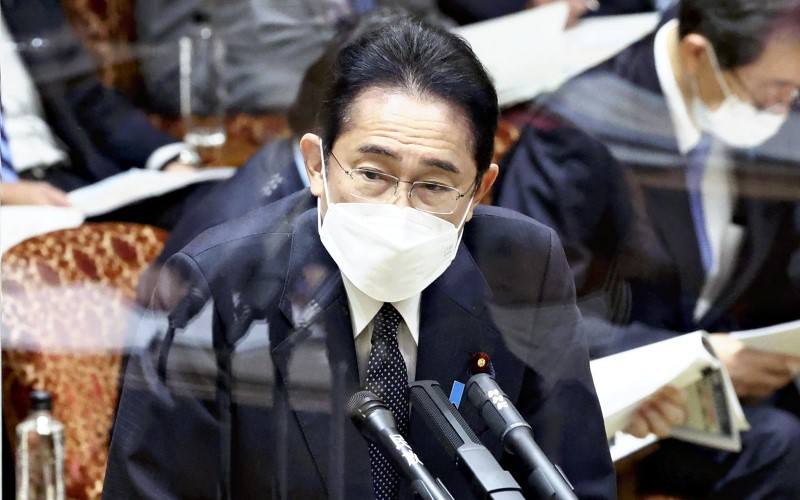Kishida: Dissolution of religious groups can be based on Civil Code violations

Prime Minister Fumio Kishida speaks at the House of Councillors Budget Committee on Wednesday.
17:47 JST, October 19, 2022
Prime Minister Fumio Kishida said Wednesday that illegal acts under the Civil Code can be the basis for a court order to dissolve a religious corporation, a comment that differs from the conventional interpretation of the Religious Corporations Law.
He made the remark at the House of Councillors Budget Committee, responding to a question regarding the Family Federation for World Peace and Unification, widely known as the Unification Church.
The Religious Corporations Law states that a court order for the dissolution of a religious corporation can be issued when “the religious corporation commits an act that is clearly found to substantially harm public welfare” in violation of laws and regulations.
According to judicial precedents, one of the requirements for a court order to dissolve a religious corporation is proof that the group violated the Penal Code, among other laws and regulations.
However, the prime minister said, “If the acts were found to be organized, vicious and continuous, among other conditions, and meet the conditions of the Religious Corporations Law, illegal acts under the Civil Code could also be included.”
Kishida said at the House of Representatives Budget Committee on Tuesday that complaints the government received through its hotline regarding the Unification Church included cases that were “possibly in violation of the Penal Code and other various rules.” Kishida indicated they could be grounds for requesting a court order for the dissolution of the religious corporation if a court finds the acts to be illegal.
Kishida also stressed that bills regulating “spiritual sales” and large monetary donations will be submitted as soon as they are ready, and that necessary preparations will start during the current Diet session.
Top Articles in Politics
-

Japan PM Takaichi’s Cabinet Resigns en Masse
-

Sanae Takaichi Elected Prime Minister of Japan; Keeps All Cabinet Appointees from Previous Term
-

Japan’s Govt to Submit Road Map for Growth Strategy in March, PM Takaichi to Announce in Upcoming Policy Speech
-

LDP Wins Historic Landslide Victory
-

LDP Wins Landslide Victory, Secures Single-party Majority; Ruling Coalition with JIP Poised to Secure Over 300 seats (UPDATE 1)
JN ACCESS RANKING
-

Japan PM Takaichi’s Cabinet Resigns en Masse
-

Japan Institute to Use Domestic Commercial Optical Lattice Clock to Set Japan Standard Time
-

Israeli Ambassador to Japan Speaks about Japan’s Role in the Reconstruction of Gaza
-

Man Infected with Measles Reportedly Dined at Restaurant in Tokyo Station
-

Videos Plagiarized, Reposted with False Subtitles Claiming ‘Ryukyu Belongs to China’; Anti-China False Information Also Posted in Japan




















